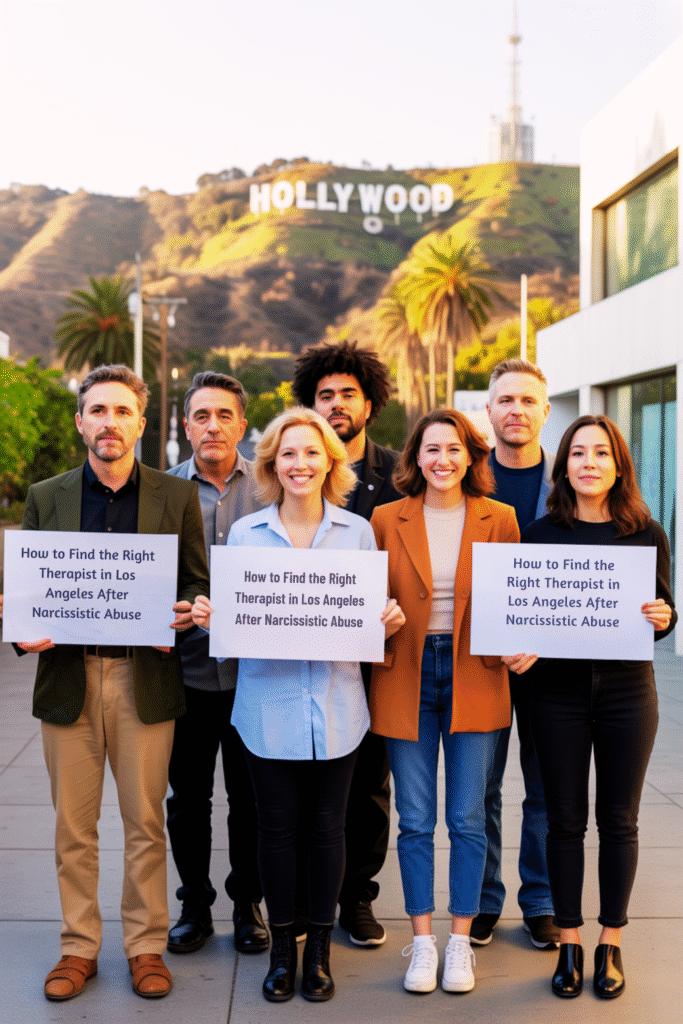Now Reading: How to Find the Right Therapist in Paris After Narcissistic Abuse
- 01
How to Find the Right Therapist in Paris After Narcissistic Abuse

How to Find the Right Therapist in Paris After Narcissistic Abuse
🇫🇷 How to Find the Right Therapist in Paris After Narcissistic Abuse
Healing from narcissistic abuse is a deeply personal, often invisible journey. Paris—with its diverse expat community and growing trauma-informed mental health scene—can feel like both a sanctuary and a labyrinth. Whether you’re in the Marais, Saint-Germain, Belleville, or working remotely from a café in Bastille, here’s a comprehensive roadmap to finding a therapist who gets it—not just because it’s their job, but because they understand you.
🛑 1. Not Every Therapist in Paris Understands Narcissistic Abuse
Let’s call it like it is: many therapists in Paris can diagnose anxiety or depression—but when it comes to gaslighting, identity collapse, trauma-bonding? Not so much. Without awareness, survivors often face:
- Minimization: “Are you sure it wasn’t just stress?”
- Pathologizing: “Why are you still so angry after all this time?”
- Blaming: “Maybe you could try forgiveness.”
- Invalidation: “Maybe you’re exaggerating?”
But recovery isn’t about sugar-coating. You need trauma-informed specialists trained in the multiplication of languages—EMDR, IFS, Schema Therapy, somatic processing—not just the French standard of CBT or mindfulness. In Paris, many therapists integrate cutting-edge modalities alongside a multicultural, expat-aware perspective .
🧠 2. What to Look For in a Therapist (Paris Edition)
| Feature | Why It Matters | Paris Examples |
|---|---|---|
| Experience with Narcissistic Abuse & Complex PTSD | You shouldn’t need to explain “gaslighting” or “trauma bonding.” | Chloé at “It’s Complicated” specializes explicitly in narcissistic abuse & PTSD for expats |
| Use of EMDR, Somatic Therapy, IFS, Brainspotting | Helps process deeper trauma, not just surface symptoms. | Institut du PsychoTrauma Paris offers EMDR, Brainspotting, ICV, somatic work |
| Long‑term, validation‑centered care | Narcissistic abuse isn’t fixed in a few sessions—it takes time and steady support. | Laura Tahli (Paris Centre) anchors journey in EMDR plus stabilization |
| Anglo‑friendly or bilingual care | Critical if English is your safe language. | Zoe Otter (Advance Worldwise): certified, trauma‑focused, English-speaking |
| Culturally and identity-aware | As an expat, LGBTQ+, BIPOC survivor, you need sensitivity to your layered experience. | Room of One’s Own: offers trauma‑informed EMDR and somatic therapy geared toward expats, queer clients |
🧊 3. 10 Essential Questions to Ask
Before Your First Paris Session
- Have you treated clients with narcissistic abuse or complex PTSD? Red flag: vague response. Green flag: names of techniques like EMDR for identity fragmentation.
- Which trauma modalities do you employ—EMDR, IFS, Brainspotting, somatic therapy? Paris advantage: many therapists offer a combination, especially at Institut du PsychoTrauma .
- What’s your approach to rebuilding self‑trust after chronic gaslighting? Look for structured support: memory work, grounding, nervous system regulation.
- How do you help someone unpack manipulation they’re still doubting? Hesitation = NOT your person.
- How do you support boundary repair in someone whose self‑limits have been erased? Should mention body awareness, nervous system skills, relational safety.
- What do you say to someone who feels guilty for staying too long? You want language around trauma bonding—not “why didn’t you just leave?”
- How do you balance fear of both intimacy and isolation? Healing isn’t binary—it’s about trusting yourself again.
- If I push back in therapy, how would you respond? Look for “collaboration,” not correction.
- Is this long-term work or solution-focused? No six-session quick-fixes—Paris therapists like Chloé offer ongoing care.
- Do you give resources between sessions? Structured practices (journaling, grounding, IFS exercises) signal commitment to your daily healing.
🏥 4. Public vs Private Care — How Paris Therapy Works
Public (Sécurité sociale / par mutuelle)
- Coverage limited: mostly CBT or general talk therapy. Few trauma-specific options.
- You may need to go private to access EMDR, Brainspotting, IFS, etc.
- Even private practices may offer partial rebates via private insurance.
Private Trauma‑Specialized Care
- Expect €80–€200/session depending on credentials & language
- Many offer free or low-cost introductory calls (e.g., Chloé’s 30‑min consult for €120)
- Private therapy in Paris is common—prepared for waitlists, but also better specialization.
Online / Telehealth
- Many therapists offer hybrid options—ideal for expats, busy workers, introverts
- Examples: It’s Complicated network, Room of One’s Own, plus telehealth from Institut du PsychoTrauma.
💼 5. Recommended Therapists & Clinics in Paris
1. Chloé – EMDR Psychotherapist (It’s Complicated)
- Specializes in narcissistic abuse, PTSD, trauma in expats
- €120/session; in-person, online, text; free 30-min intro
2. Institut du PsychoTrauma Paris (Diane Samama et al.)
- Offers EMDR, Brainspotting, ICV, TCC, somatic therapy
- Combines psychiatry, psychology, micro‑kinésithérapie—a profound multidisciplinary approach
3. Laura Tahli – EMDR Therapist (Paris Centre)
- Scientific, stabilization-focused EMDR for PTSD, anxiety, identity repair
- Recognized by Inserm, HAS, APA, WHO
4. Zoe Otter – Trauma Specialist (Advance Worldwise)
- English-speaking, Chartered Psychologist—expert in EMDR & DBT
- Located in 75015; experienced with multicultural clients
5. Room of One’s Own
- Somatic EMDR & brain-rewiring techniques; tuned to expats, queer/trans communities
- Sessions online & in-person
6. Paris Psychology Centre & Allied Practitioners
- Bilingual clinical teams specializing in CBT + EMDR for trauma
- Examples: Rosemarie Bourgault, Dr. Patsalides Hofmann, etc.
🔍 6. Additional Ways to Find Trauma-Informed Practitioners
- Inclusive Therapists directory: Focuses on BIPOC, LGBTQIA+ trauma care in Paris-based EMDR specialists
- TherapyTribe: Lists trauma/PTSD therapists offering EMDR, ACT, DBT, SFT, narrative, and more
📚 7. Why These Modalities Matter
- EMDR – Eye Movement Desensitization and Reprocessing is evidence-based for trauma, PTSD, and complex PTSD. Recognized by WHO, Inserm, HAS, APA
- Brainspotting / Somatic – Helps locate where trauma is stored in the body, great for shame, shame-frozen identity.
- IFS (Internal Family Systems) – Ideal for re-integration of fragmented selves after gaslighting.
- Schema Therapy & Somatic Experiencing – Common in wider trauma work. Paris providers integrate these at psycho‑trauma hubs.
🧭 8. Survivor-Led & Support Resources in Paris
While therapist work is powerful, community care completes your journey:
- SOS Help – Bilingual (English/French) crisis helpline and support.
- Domestic abuse groups – Many local NGOs provide group therapy or peer circles.
- Online exile and trauma networks for expats connecting virtually or in-person.
⚖️ 9. Cost, Logistics & What to Expect
- Session fees: range from €50–90 for emerging therapists to €120–200+ for highly specialized clinicians.
- Insurance: partial reimbursement via private plans; public care limited in scope.
- Intro calls: Most providers offer brief free or low-cost discovery calls.
- Formats: in-person (Paris arrondissements), online (France, EU, international), some via text.
- Waitlists: strong demand for trauma-informed EMDR—book weeks in advance.
🛠 10. Self‑Care & the Road to Recovery
Therapy is only one pillar of healing. Consider:
- Support groups: Activate your sense of “you’re not alone”
- Pace + community: Regular contact with kind humans protects against isolation.
- Grounding tools: Breathwork, polyvagal exercises, journaling, trauma-informed yoga, movement—heavyweights in C-PTSD recovery
- Boundaries & identity: Reclaim self-trust through assertive practices daily.
🧩 11. Sample Plan: From Search to Healing
- Self-reflection: What culture/style fits you? Practice-heavy, analytic, or creative somatic space?
- Intro chats: Contact 3‑5 therapists from the suggestions above. Ask your essential questions.
- Commit: Find a therapist you trust and who respects your pace—that’s your workhorse.
- Support: Join a group, leverage community, build rituals.
- Assess: After 8–12 sessions, check in: Are you feeling safer? More consistent in your own truth?
- Repeat or adjust: Healing is iterative—integration, then deeper work; adjustments normal.
🏁 Final Thoughts
You didn’t imagine it. You weren’t wrong. Narcissistic abuse dismantled your sense of safety—and that’s not a personal failure; it’s a trauma response.
Now: you’re waking up. You’re searching for therapy that validates, digs deep, tends to your nervous system, and rebuilds what was taken. Whether it’s Chloé’s EMDR work for expats, the multidisciplinary care at Institut du PsychoTrauma, Zoe Otter’s trauma mastery, or somatic pathways via Room of One’s Own—you have options crafted for your kind of healing.
You deserve care that’s courageous, honest, and slow enough for your raw edges to find rest and rewrite your inner dialogue. Paris is ready—with its trauma-informed community, multilingual networks, and deep-well therapies—to help you reclaim who you are.
You survived the worst of the abuse. Now, in this city of light, reclaim the brightest parts of you—your voice, your trust, your witness.
“You’re not asking for too much. You’ve just been asked to accept too little—for far too long.” Now isn’t the time to settle. It’s your healing. Demand the real thing.






-dream-team-your-tactical-6-pack-to-exit-heal-reclaim-after-narcissistic-abuse.png)








